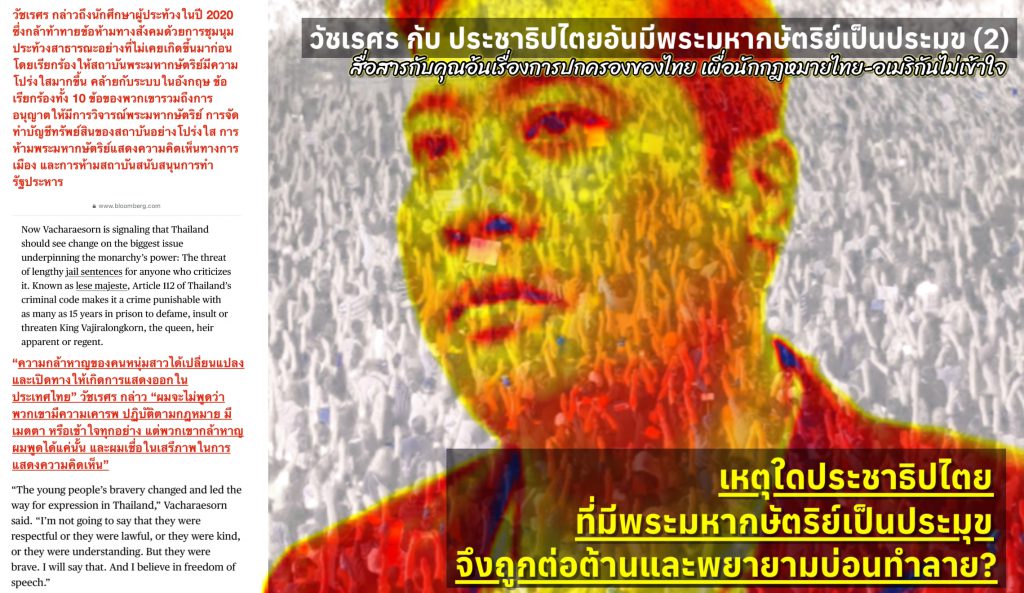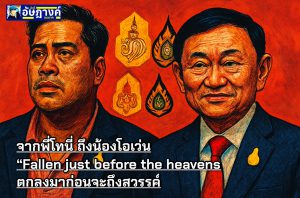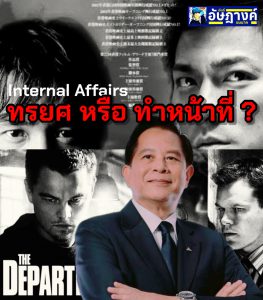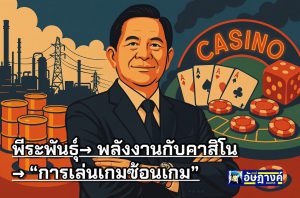
วัชเรศร กับ ประชาธิปไตยอันมีพระมหากษัตริย์เป็นประมุข (2)
โดย อัษฎางค์ ยมนาค
เหตุใดประชาธิปไตยที่มีพระมหากษัตริย์เป็นประมุขจึงถูกโจมตีและพยายามบ่อนทำลาย?
บทนำ
แม้ว่าการปกครองในระบอบ ประชาธิปไตยอันมีพระมหากษัตริย์เป็นประมุข จะได้รับการยอมรับว่าเป็น ระบบที่มีเสถียรภาพและช่วยรักษาความต่อเนื่องของรัฐ แต่กลับถูกต่อต้านจากขบวนการทางการเมืองบางกลุ่มที่ต้องการ ลดบทบาทหรือล้มล้างสถาบันพระมหากษัตริย์ ปรากฏการณ์นี้ไม่ได้เกิดขึ้นเฉพาะในประเทศไทย แต่พบเห็นได้ในหลายประเทศตลอดประวัติศาสตร์
ในช่วงไม่กี่ปีที่ผ่านมา ได้เกิดขบวนการทางการเมืองที่เรียกร้องให้ ปฏิรูปหรือล้มล้างสถาบันพระมหากษัตริย์ รวมถึงการยกเลิก มาตรา 112 ของกฎหมายอาญา ซึ่งนำไปสู่ข้อถกเถียงอย่างกว้างขวาง ขบวนการเหล่านี้มีทั้งพรรคการเมือง เช่น พรรคอนาคตใหม่ พรรคก้าวไกล พรรคประชาชน รวมถึงกลุ่มประชาชนและองค์กรภาคประชาสังคมที่เคลื่อนไหวในประเด็นนี้ และล่าสุดบทสัมภาษณ์ของคุณอ้น วัชเรศร วิวัชรวงศ์ ได้สร้างข้อถกเถียงเกี่ยวกับท่าทีของเขาต่อแนวทางเหล่านี้
การต่อต้านสถาบันพระมหากษัตริย์สามารถวิเคราะห์ได้ผ่าน ทฤษฎีทางรัฐศาสตร์และมุมมองทางสังคมการเมือง ซึ่งเผยให้เห็นถึงแรงจูงใจของกลุ่มที่ต้องการลดทอนหรือทำลายบทบาทของสถาบัน โดยสามารถแบ่งปัจจัยหลักที่อยู่เบื้องหลังออกเป็น 3 ประเด็น ได้แก่
1.การช่วงชิงอำนาจทางการเมือง – กลุ่มอำนาจบางกลุ่มมองว่าสถาบันพระมหากษัตริย์เป็นอุปสรรคต่อการรวบอำนาจ
2.ความขัดแย้งทางชนชั้นและแนวคิดประชาธิปไตยสุดโต่ง – การพยายามบิดเบือนบทบาทของสถาบันให้เป็นชนชั้นปกครองที่กดขี่ประชาชน
3.อิทธิพลจากต่างชาติและกระแสโลกาภิวัตน์ – การใช้แนวคิดจากตะวันตกเพื่อกดดันให้ประเทศไทยเปลี่ยนแปลงระบบการปกครอง
1. การแย่งชิงอำนาจทางการเมืองและแนวคิดอำนาจนิยม
ทฤษฎีอำนาจของ Max Weber
นักสังคมวิทยา Max Weber อธิบายว่าอำนาจทางการเมืองมี 3 รูปแบบหลัก ได้แก่
1.1) Traditional Authority (อำนาจเชิงจารีตประเพณี) – อำนาจที่เกิดจากขนบธรรมเนียมและสถาบันดั้งเดิมเช่นสถาบันพระมหากษัตริย์
1.2) Rational-Legal Authority (อำนาจตามกฎหมาย) – อำนาจของรัฐบาลที่มาจากการเลือกตั้ง
1.3) Charismatic Authority (อำนาจเชิงบารมีส่วนบุคคล) – อำนาจของผู้นำที่ได้รับความนิยมจากประชาชน
ในระบอบประชาธิปไตยที่มีพระมหากษัตริย์เป็นประมุข มีอำนาจคู่ขนาน (Dual Authority) ซึ่งบางกลุ่มมองว่าสถาบันพระมหากษัตริย์เป็นอุปสรรคต่อการรวบอำนาจเบ็ดเสร็จ
เหตุใดกลุ่มทางการเมืองบางกลุ่มต้องการลดบทบาทของสถาบันพระมหากษัตริย์?
• การล้มล้างสถาบันฯจะทำให้พวกเขาสามารถควบคุมอำนาจรัฐได้เต็มที่โดยไม่ต้องมีอำนาจที่สามารถตรวจสอบและคานอำนาจได้
• การโจมตีสถาบันฯเป็นกลยุทธ์ทางการเมืองที่ใช้ปลุกระดมประชาชนให้เห็นว่าสถาบันฯเป็นอุปสรรคของประชาธิปไตยทั้งที่ในความเป็นจริงสถาบันฯมีบทบาทสำคัญในการรักษาสมดุลของอำนาจทางการเมือง
ตัวอย่างในประวัติศาสตร์ของการล้มล้างสถาบันกษัตริย์
• การปฏิวัติรัสเซีย (1917) – กลุ่มบอลเชวิคของเลนินสร้างกระแสให้ประชาชนเชื่อว่าสถาบันกษัตริย์เป็นอุปสรรคของความเท่าเทียมหลังจากนั้นรัสเซียกลายเป็นรัฐเผด็จการพรรคเดียวที่จำกัดเสรีภาพของประชาชน
• การปฏิวัติฝรั่งเศส (1789) – ผู้นำปฏิวัติทำให้ประชาชนเชื่อว่ากษัตริย์เป็นศัตรูของเสรีภาพแต่ภายหลังการล้มล้างสถาบันกษัตริย์ประเทศกลับเผชิญกับความไร้เสถียรภาพทางการเมืองความรุนแรงและการขึ้นสู่อำนาจของจักรพรรดินโปเลียน
กรณีของไทย
ในประเทศไทย กลุ่มที่ต้องการ เปลี่ยนแปลงไปเป็นระบบสาธารณรัฐ มักใช้ โซเชียลมีเดียและสื่อการเมือง เพื่อปลูกฝังให้ประชาชนมองว่าสถาบันฯ เป็นอุปสรรคของระบอบประชาธิปไตย ทั้งที่ในความเป็นจริง ระบอบประชาธิปไตยอันมีพระมหากษัตริย์ทรงเป็นประมุขแตกต่างจากระบอบสมบูรณาญาสิทธิราชย์โดยสิ้นเชิง
2. ทฤษฎีความขัดแย้งทางชนชั้นและแนวคิดประชาธิปไตยสุดโต่ง
แนวคิดความขัดแย้งทางชนชั้นของ Karl Marx
Karl Marx อธิบายว่า สังคมแบ่งออกเป็นสองชนชั้นหลัก ได้แก่
2.1) ชนชั้นปกครอง (Elite Class) – ผู้ที่มีอำนาจทางเศรษฐกิจและการเมือง
2.2) ชนชั้นแรงงาน (Proletariat Class) – กลุ่มที่ถูกชนชั้นนำกดขี่
กลุ่มต่อต้านสถาบันบางกลุ่มพยายาม บิดเบือนแนวคิดนี้ โดยทำให้ประชาชนเชื่อว่า สถาบันพระมหากษัตริย์คือชนชั้นนำที่กดขี่ประชาชน
แนวคิดประชาธิปไตยสุดโต่ง (Radical Democracy)
• กลุ่มที่สนับสนุนประชาธิปไตยแบบสุดโต่งเชื่อว่าทุกสถาบันที่มีอำนาจเหนือประชาชนต้องถูกทำลายรวมถึงสถาบันพระมหากษัตริย์
• แนวคิดนี้มองข้ามความจริงที่ว่าสถาบันพระมหากษัตริย์ไทยมีบทบาทในการพัฒนาสังคมและเศรษฐกิจ
ข้อเท็จจริงที่ต้องพิจารณา
• สถาบันพระมหากษัตริย์ไทยไม่ใช่ชนชั้นปกครองที่กดขี่ประชาชนแต่เป็นสถาบันที่ทำงานเพื่อประชาชนมาโดยตลอด
• มีโครงการพัฒนาต่างๆที่ช่วยเหลือประชาชนโดยตรงแตกต่างจากระบบที่มุ่งเน้นแสวงหากำไรเพื่อกลุ่มชนชั้นนำ
3. อิทธิพลจากต่างชาติและแนวคิดโลกาภิวัตน์
บทบาทของสื่อและองค์กรระหว่างประเทศ
ในโลกยุคใหม่ สื่อและองค์กรต่างชาติบางส่วน มีอิทธิพลต่อการผลักดันแนวคิดประชาธิปไตยแบบเสรีนิยม ส่งผลให้เกิดกระแสวิพากษ์วิจารณ์ต่อสถาบันแบบดั้งเดิม รวมถึงสถาบันพระมหากษัตริย์
เหตุใดบางประเทศตะวันตกต้องการลดบทบาทของสถาบันพระมหากษัตริย์ไทย?
• ประเทศตะวันตกส่วนใหญ่เป็นสาธารณรัฐ (Republic) หรือประชาธิปไตยแบบเสรีนิยม (Liberal Democracy)
• ไทยเป็นหนึ่งในไม่กี่ประเทศที่ยังคงมีสถาบันพระมหากษัตริย์ที่เข้มแข็งทำให้บางองค์กรพยายามผลักดันแนวคิดสาธารณรัฐในไทย
ข้อเท็จจริงที่ต้องเข้าใจ
• แม้ว่าประเทศตะวันตกบางแห่งจะวิพากษ์วิจารณ์ประเทศไทยแต่พวกเขาเองยังคงมีสถาบันกษัตริย์ที่มั่นคงเช่นสหราชอาณาจักรญี่ปุ่นและสเปน
• หากระบอบกษัตริย์ขัดแย้งกับประชาธิปไตยเหตุใดหลายประเทศที่พัฒนาแล้วจึงยังคงมีสถาบันกษัตริย์?
บทสรุป
สถาบันพระมหากษัตริย์ไทยไม่ใช่ศัตรูของประชาธิปไตย แต่เป็น กลไกสำคัญที่ช่วยรักษาเสถียรภาพของชาติ การโจมตีสถาบันฯ ส่วนใหญ่มาจาก แรงจูงใจทางการเมือง อุดมการณ์สุดโต่ง และอิทธิพลจากต่างชาติ มากกว่าปัญหาภายในระบบการปกครองเอง
Why Constitutional Monarchy Faces Opposition and Attempts at Undermining?
Introduction
Although constitutional monarchy is widely regarded as a system that provides stability and continuity, it has been the target of opposition from political movements that seek to diminish or abolish the institution. This phenomenon is not unique to Thailand but has been observed throughout history in various countries.
In recent years, political movements advocating for the reform or even abolition of the monarchy, as well as the repeal of Article 112 (the lèse majesté law), have sparked national debates. These movements, led by political parties such as the Future Forward Party, Move Forward Party,The People’s Party and various civil society groups, have challenged the traditional role of the monarchy within Thai governance.
And recently, the latest interview with Vacharaesorn Vivacharawongse has sparked debate regarding his stance on these issues.
The opposition to constitutional monarchy can be analyzed using political science theories and socio-political perspectives, which reveal the motives and objectives of groups that seek to weaken or eliminate the monarchy. This essay explores three key factors behind this opposition:
1. Power Struggle and Authoritarianism – How some political factions see the monarchy as an obstacle to absolute power.
2. Class Conflict and Radical Democracy – How ideological movements attempt to frame monarchy as an elite system that oppresses the people.
3. Globalization and Foreign Influence – How international pressure and external narratives attempt to reshape Thailand’s governance structure.
1. Power Struggle and Authoritarian Ambitions
Max Weber’s Theory of Authority
Sociologist Max Weber identified three forms of authority that influence political power:
1.1) Traditional Authority – Power derived from long-standing customs and institutions (e.g., monarchy).
1.2) Rational-Legal Authority – Power based on laws and democratic governance (e.g., elected governments).
1.3) Charismatic Authority – Power based on personal appeal and mass influence (e.g., revolutionary leaders).
The presence of monarchy in a constitutional system creates a parallel authority (dual authority) that exists alongside elected governments. Some political factions view the monarchy as an obstacle to their ability to consolidate absolute control over the state.
Why Do Political Groups Seek to Undermine the Monarchy?
• Eliminating monarchy removes political checks and balances. Some political groups believe that reducing the monarchy’s role will allow them to centralize power without an institution that holds long-term national legitimacy.
• Attacking the monarchy as a political strategy. Some movements use rhetoric against the monarchy to gain public support, framing it as a barrier to democracy to further their political ambitions.
Historical Examples of Monarchical Abolitions
• The Russian Revolution (1917) – The Bolsheviks, led by Lenin, propagated the idea that the monarchy was an obstacle to equality. After its abolition, the Soviet Union became a one-party authoritarian state that suppressed political freedoms.
• The French Revolution (1789) – Revolutionary leaders convinced the public that the monarchy was an enemy of liberty. However, the removal of the monarchy led to years of political instability, radical violence, and dictatorship under Napoleon Bonaparte.
The Case of Thailand
In Thailand, certain groups advocate for a republican system, often using social media and political campaigns to portray the monarchy as an obstacle to democracy. However, Thailand’s governance is not an absolute monarchy but a constitutional monarchy, which operates differently from the outdated feudal systems that some critics claim it to be.
2. Class Conflict Theory and Radical Democracy
Karl Marx’s Class Conflict Theory
Marxist theory argues that society is divided into two main classes:
2.1) The Ruling Class (Elite Class) – Those who control political and economic power.
2.2) The Working Class (Proletariat Class) – Those who are allegedly oppressed by the ruling class.
Some anti-monarchy movements attempt to distort this theory by portraying the monarchy as part of the elite ruling class, arguing that it prevents social mobility and democracy.
Radical Democracy and Its Influence
Advocates of radical democracy believe that all institutions of power must be dismantled, including the monarchy. However, this ignores the historical role of monarchies in balancing political power and fostering national stability.
The Reality of the Thai Monarchy
• The monarchy is not an oppressive ruling class. Unlike political elites who engage in economic and political power struggles, the monarchy in Thailand has played a role in nation-building, social welfare, and disaster relief efforts.
• The monarchy’s contribution to development. Various royal projects have benefited the people, particularly in education, agriculture, and rural development. This contradicts the notion that it is a system designed to exploit the lower classes.
While radical democracy movements often frame the monarchy as an elite structure that must be dismantled, the actual function of the monarchy has been to serve as a unifying institution rather than a ruling class entity.
3. Globalization and Foreign Influence
How International Narratives Shape Public Perception
In the modern world, international media and foreign organizations influence democratic movements by promoting their own models of governance. Countries with republican or liberal democratic systems often view constitutional monarchy as outdated, leading to external pressure on nations that maintain such systems.
Why Some Western Nations Push for a Republican System in Thailand?
• Most Western democracies are republics. Countries such as the United States and France do not have monarchies and often support governance models that resemble their own.
• Thailand is one of the few remaining strong monarchies. Some foreign organizations advocate for a republican shift, not necessarily out of concern for democracy, but to align Thailand’s political system with their own ideological frameworks.
Contradictions in Foreign Criticism
• While some Western media outlets criticize the Thai monarchy, they do not apply the same scrutiny to constitutional monarchies in the UK, Japan, or Spain.
• If monarchies were truly incompatible with democracy, why do many democratic countries still retain them?
Understanding the Bigger Picture
The push to weaken Thailand’s monarchy is not merely about democracy; it involves geopolitical interests, ideological influences, and the global realignment of power structures.
Conclusion: Why Attacks on the Monarchy Are Politically Motivated
Analyzing the opposition to constitutional monarchy through political science theories reveals that the monarchy is not inherently the problem; rather, it is targeted due to power struggles, ideological battles, and geopolitical influences.
1. Political Power Struggles – Certain political factions see the monarchy as an obstacle to their consolidation of power.
2. Radical Democratic Movements – Some groups misuse class conflict theories to frame the monarchy as oppressive, despite its historical contributions to national development.
3. Global Influence and Foreign Narratives – Some international actors push republican models, ignoring the fact that many successful democracies still retain monarchies.
The Reality for Thai Society
• The constitutional monarchy is not the enemy of democracy but rather a system that has helped maintain national stability and political balance.
• If the monarchy were abolished, political power would likely fall into the hands of a select few, leading to increased authoritarianism or political turmoil.
Protecting the constitutional monarchy is not about preserving tradition alone—it is about ensuring the stability of Thailand’s democracy and national identity.



